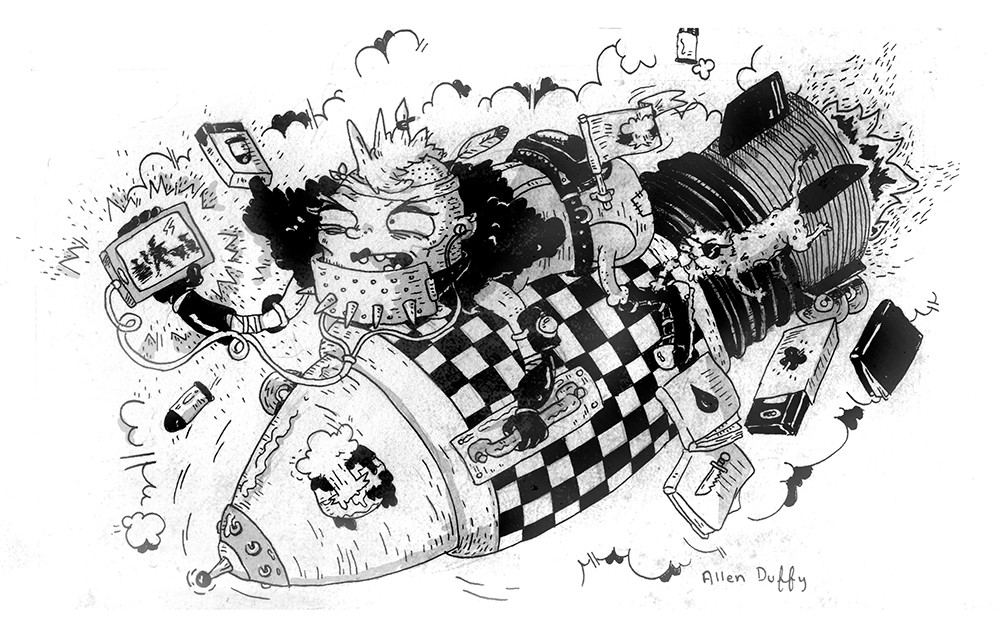In the concrete bowels of Mount St. Michael, a traditionalist Catholic parish in far North Spokane, it's easy to feel disconnected from the world above. Only harsh fluorescent bulbs illuminate the winding, narrow path through the basement — past where the nuns wash and dry their blue-and-white habits, past a pockmarked basalt boulder that wouldn't budge during construction of the five-story, manor-like structure 100 years ago and past where many of the academy's schoolbooks and supplies are stored — into the remnants of the building's designated fallout shelter, first created after World War II.
Reverend Father Casimir Puskorius ducks his balding head into the innermost storage facility. He points to the dusty brown cardboard boxes and water drums lining the stone wall's shelves — Office of Civil Defense-provided water, biscuits and sanitation kits stamp-dated 1963. He estimates there are 25 of each.
"This is where the Jesuit priests would have come had there been a raid," explains Puskorius, who's been at the parish since 1986. "They would have thrown open their doors and invited anyone who was around this area to find shelter here."
His fellow tour guide, Sister Mary Paula, doesn't have an explanation as to why these containers are still here, or why the yellow-and-black fallout shelter signs (capacity 480) still hang outside of the building.
"We just haven't taken those down," she says.
Spokane never exploded into oblivion during the Cold War, but bits of that conflict remain in dozens of basements and backyards around our city. These leftovers, which Seattle author Lee O'Connor refers to as the ruins of modern society, led the historian to self-publish last year's Take Cover, Spokane.
In it, he discusses the height of bunker hysteria in 1961, the same year President John F. Kennedy, during his Berlin Crisis speech, urged Congress to "identify and mark space in existing structures — public and private — that could be used for fallout shelters in case of attack." Each would be supplied with water, food and first aid kits.
The threat to Washington state was quite real on both sides of the Cascades, being so (relatively) close to Russia, but Spokane was more of a target, says O'Connor, who holds a master's degree in history from Washington State University. The area was home to nine Atlas missile bases, and Fairchild Air Force Base was outfitted with B-52 bombers capable of carrying nuclear weapons.
To write the book, O'Connor visited many decaying bunkers and hideaways and sorted through every yellowing archive he could find. His home was taken over by a self-made timeline of old newspaper clippings that snaked through multiple rooms.
"History is messy. It's not an ideal story with a conventional narrative," O'Connor explains. "In history, people go one direction and say, 'Let's build shelters,' only to later say, 'We're going to evacuate' [as Spokane's emergency plan now dictates]."
By the late 1960s, America's civil defense program lost steam as the threat of nuclear attack dwindled. But our obsession with the possibility of human eradication/survival remained.
To date, The Hunger Games franchise has grossed more than $1 billion, the Mad Max reboot hits in May, The Walking Dead is the most watched show on cable, and new shows like Last Man on Earth, starring Will Forte, and Netflix's The Unbreakable Kimmy Schmidt (about a woman rescued from a doomsday cult) are already critical darlings.
"I think that's an interest humans have had since the beginning of time," O'Connor says. "We're fascinated with our own existence and the possibility we could have our own extinction, like the dinosaurs did."
At Mount St. Michael, they have their own ideas about why we like death and destruction in film, TV and literature.
Sister Mary Paula notes that threats from ISIS and North Korea have put us on edge, but that we're not too worried about it. Through the onslaught of violence in pop culture and video games, we're allowed to be complacent about death; we've lost our sensitivity for human life, she says.
"I know if I had one day left on this earth, I certainly wouldn't be partying," she says, walking out into the damp, gray air at the end of our tour. "I'd be talking to God." ♦
Lee O'Connor comes to Auntie's Bookstore (402 W. Main) on Saturday, May 30, for a Take Cover, Spokane book signing and author Q&A.


